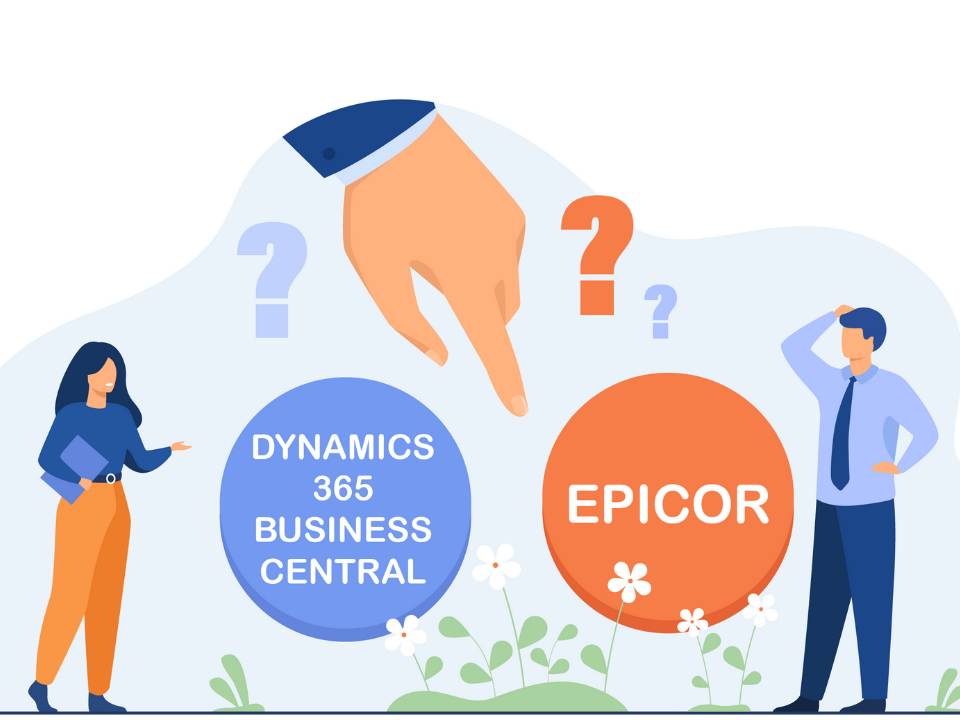Today’s global economy makes it essential to explore any and all tools that can give your business a competitive edge. Big or small, most companies can’t afford to go without enterprise resource planning or ERP financial management. The software seamlessly manages and integrates all your business’s financials, reporting, operations, and more.
Finding the best ERP for your company’s needs can help compare multiple solutions before choosing one. We previously compared Dynamics 365 Business Central with Infor and Oracle NetSuite. In this post, we’re examining how Microsoft’s popular ERP compares to Epicor, which was recently renamed Kinetic.
Dynamics 365 Business Central vs. Epicor (Kinetic)
Both Dynamics 365 and Epicor are considered top performers, particularly for functionality. They offer similar features with some minor differences. However, a few features, such as cost, support services, usability, and implementation, set them apart. Let’s dig into the pros and cons of each.
Microsoft Dynamics 365 Business Central Overview
Microsoft Dynamics 365Business Central is one of the major players in the ERP market today. The cloud-based solution targets SMBs and combines components of CRM and traditional ERP system capabilities that help manage specific business functions. To provide maximum flexibility and extensibility, its focus is on key groups within a business. It’s valued for its easy customization, full integration capabilities, and flexible payment structure.
Epicor (Kinetic) Overview
Unlike Dynamics 365, Epicor’s software is an industry-specific, growth-focused ERP system targeted at mid-size and large businesses. It’s a complete end-to-end cloud-based solution that’s easy to customize for reporting and data storage. It’s strongly positioned for the manufacturing sector and has a limited partner network.
Business Central and Epicor Feature Comparison
Now let’s examine how Dynamics 365 and Epicor compare with one another in some fundamental ways.
Overall Performance
Head-to-head comparisons give Dynamics 365 Business Central a lead over Epicor in the basic categories of ease of use, customer service, features, value for money, and likelihood to recommend to others.
Customization
Customization is one of Business Central’s major strengths. It easily integrates with Microsoft tools like Outlook, Excel, and Word as well as with third-party applications. The software is easy to navigate and can be personalized and enhanced to fit a user’s unique needs. Epicor is also customizable, with the new Kinetic design allowing users to modify interface elements to fit their wants. For best results, Epicor’s setup must be done according to the company’s recommendations.
Implementation
This category has a clear winner. Nearly every review for Epicor is a negative one due to the lengthy process and poor inside consulting. Support is also poorly rated, with over half of users saying navigation is non-intuitive and time-consuming. Business Central, on the other hand, is typically deployed in a couple of weeks.
Pricing
Business Central’s licensing is $70 per user per month and add-ons are available. Implementation costs start at just under $20,000, and contracts are managed through Microsoft Partners. Epicor and its partners do not publicly list pricing information, but reports are that licensing is $175 per user per month. System upgrades, add-on features, and maintenance carry additional costs.
Why Choose Microsoft Dynamics 365 Business Central
Ultimately, your business’s specific needs determine which ERP you should choose. Both Dynamics 365 and Epicor Kinetic offer great features, but Business Central tends to be a better choice for SMBs. Because it easily integrates with different Microsoft products, including Office 365, Azure, and other suite products, Microsoft Dynamics 365 is a terrific solution for modernizing your present accounting system.



